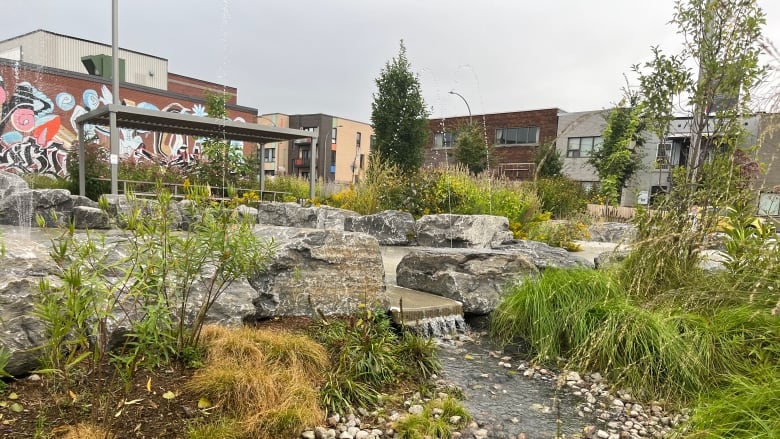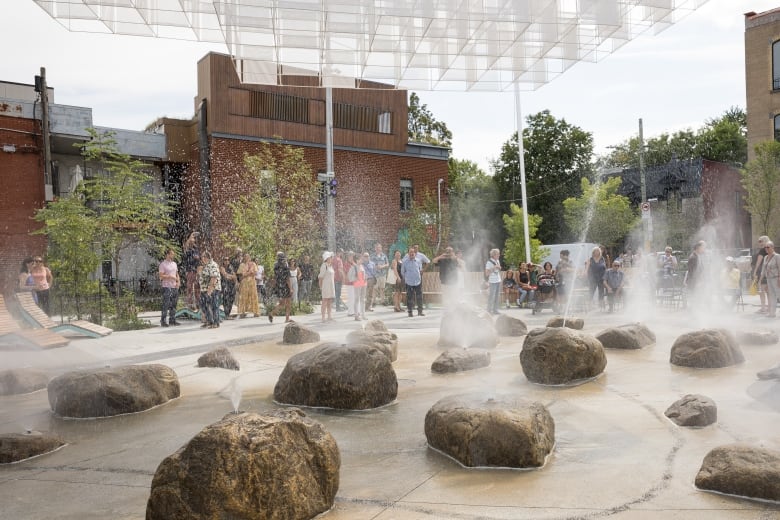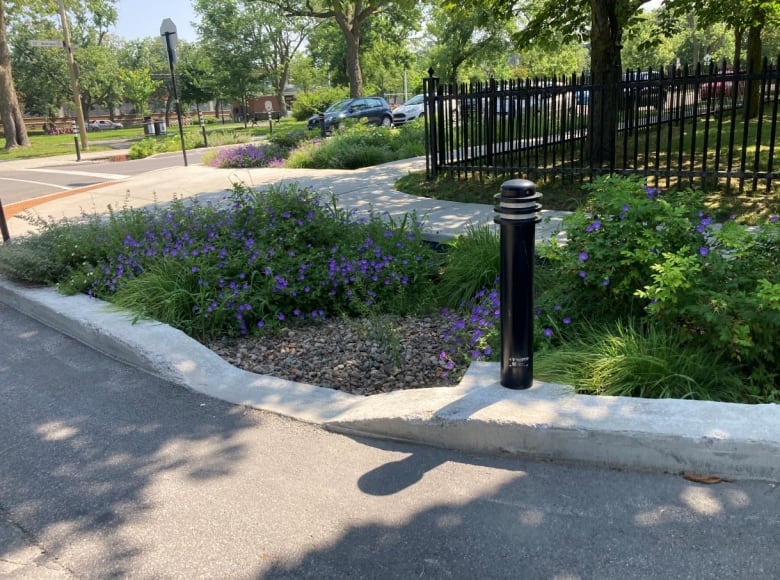Montreal building more sponge parks, sidewalks to soak up heavy rainfall
Above-ground infrastructure more effective, cheaper than underground, city says

The city of Montreal is planningto build more urban "sponge" infrastructure to protect against future flood waters brought on by climate change.
The announcement Tuesday came as Montreal once again found itself drying out afterheavy rainfall pummelled the city in the early morning.
The city plans to build 30 sponge parks and 400 more sponge sidewalks by 2025 green spaces that naturally absorb excess rainfall instead of draining the water directly into neighbourhood sewers.
The spaces would add to the seven sponge parks and 800 sponge sidewalks built since 2022, according to the city.

"The impact of heavy rainfall can be reduced by redirecting water to the river, retaining it until the sewer system is available, or gradually releasing it through the ground," the release reads.
The citysays it plans to install at least enough green drainage infrastructure to retain the equivalent of three Olympic swimming pools' worth of water.
"Unlike underground developments, these surface developments are an effective and more economical way to reduce the impacts of heavy rains," the city says.

Speaking at the Adaptation Futures international conference on climate change, Montreal Mayor Valrie Plante said sponge infrastructure is "no magic wand," but one action among others, like renovating sewers systems, that need to be taken together to mitigate the effects of climate change.
"We started putting sponge sidewalks in 10 years ago in the Plateau and RosemontLa Petite-Patrie, and now we see everyone wants one. It's important to go step by step," she said , pointing out that some neighbourhoods, like the Centre-Sud in the lower part of the city, are particularly at risk.
WATCH| A city of Montreal engineer explains how this sponge park worksin Park Ex:
However, boroughs wanting sponge parks will have to meet the city's standards before they getthe green light.
"We're adding the criteria of adaptation to climate change for renovating certain parks," said Plante.
Marie-Andre Mauger, the executive committee member responsible for the environment and ecological transition, said the plan is to bring sponge parks to all 19 of the cityboroughs, but that there12 boroughs in particular, areas especially pronetoabove-ground flooding, in their sights.
Right now, the city is working on building five sponge zones in Verdun alone, Mauger said.
The project will be funded by the $117-million agreement with the Quebec government as part of its green economy plan.
The Plante administration has pledged to set aside 10to 15 per centof its three-year capital expenditure programfor green infrastructure.

Step in the right direction, experts say
Alain Bourque, executive director of Ouranos, Quebec's climatology and climate change innovation hub, said building more water-retention infrastructure is a step in the right direction,as Montreal receives more frequent and intense rainfall.
"It's not necessarily the best approach to reconstruct all of the sewer systems in Montreal, and it's almost impossible," said Bourque. "So you have to act on the surface and find ways that water infiltrates elsewhere than in the sewer systems that are unable to cope with those thunderstorms."
Mechanical engineering professor Amar Sabih also welcomes the city's proposed water-retention projects but says they won't benearly enough to solve the problem of flooding. Areas chosen for sponge infrastructure should be chosen based on flooding history and must be paired with revamped sewer systems underneath to properly withstand the water gushing in, Sabih told CBC.
Most of all, Montreal needs to fortify its residents'homes and build smarter all across the city, and the only way to do that is to flood-proofbuildings.
"We need to change our way of building," said Sabih, who is also a member of Rseau Inondations InterSectoriel du Qubec (RIISQ), a group that brings policy-makers and engineers together to better prepare against flooding.
"Climate change is leading us to have floods everywhere, so no city is immune. No neighbourhood is immune."
More than 1,500 international climate change adaptation specialists are meeting this week at the Adaptation Futuresconference to discuss best practices in responding to the challenges posed by climate change.
with files from Presse Canadienne, Radio-Canada and Rowan Kennedy













_(720p).jpg)


 OFFICIAL HD MUSIC VIDEO.jpg)
.jpg)



























































































